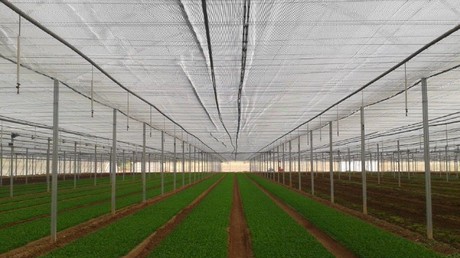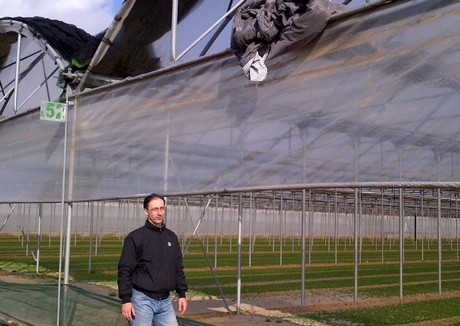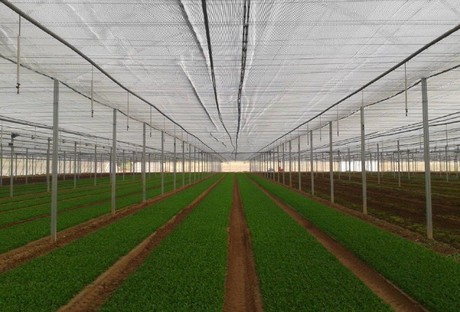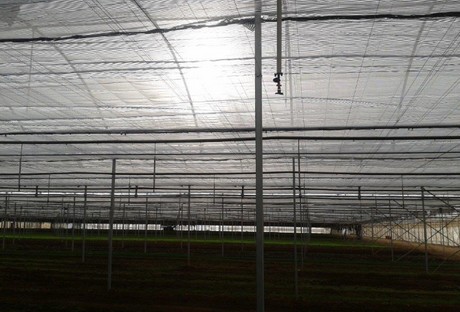
From Hortidaily.com:
http://www.hortidaily.com/article/24281/Combine-shading-nets,-thermal-screens-for-better-crop

Fresh-cut salads, like corn salad (valerianella locusta) are typically cultivated in winter, from spring to autumn they needs shade and low temperatures. In particular, temperatures above 28 degrees combined with excessive light, cause damage to this delicate salad (lower growth, burned leaves, dead plants). Therefore the management of temperature and insolation from spring to fall initially forced growers to use whitewash and removable coatings, which lower the temperature and solar irradiation inside the tunnels and greenhouses. However, these were solutions with many limitations, and therefore Dr. Carlo Bignami, one of the partners of the Italian screens manufacturer Aduno, began to explore the combined use of shading nets and thermal screens.

Doctor Agronomist Carlo Bignami is specialized in ready-to-eat products that are being cultivated under greenhouses/tunnels and knows a lot about the baby leaf. As a freelancer, since 1998, he collaborates with leading grower companies in Spain and Italy. His range of interest includes the design and mechanization of greenhouses and relative installations, and everything related to the proper management and operation of the company.
As Dr. Carlo Bignami began to explore the combined use of shading nets and thermal screens, he discovered the following:
“The thermal screens allow greater flexibility in controlling light and thus temperature, either fixed or movable (manual). They improve the yield, the quality and consistency of production,” says Dr. Bignami. “If we then go for an automatic movable screens installation we obtain further improvements, in addition to a considerable reduction of the labor force, which is actually one of highest production costs. Particularly in summer 2015, marked by high temperatures both in Spain and Italy, the combined use of shading nets and thermal screens guaranteed a minimum production of 300 grs/sqm for each harvest, against burned crop obtained under the use of whitewash.”

The solution that ensured best results on this crop is the combination of shading and refreshing thermal screens and specially developed shading nets. The name of this match is Basic5 Comboscreens for Baby Leaf.
Dr. Bignami explains:”The use of the combination of two BASIC5 layers over cultivations, both in Spain and in Italy, enabled a lowering of the temperature by 3 degrees compared to traditional systems (white tape shading nets or white woven fabrics like groundcovers), increased air exchange (more carbon dioxide and more thermo regulation) ensuring a consistently higher quality (more green leaves, more tissue consistency, greater weight), a lower incidence of fungal diseases and a higher yield of 300 gr/sqm for each of the 6-7 annual harvests.

The benefits from Basic5 Comboscreens for Baby Leaf are not only limited to the “summer production cycles”, from April to September, but it also enhances and standardizes germination and weed control in the “winter production cycles”, from October to March. In addition, the correct handling of thermal screens & shading nets involves having on a average more dry soil on the surface, providing a decisive reduction of fungal diseases.
“In particular, the double shading allows to modulate the insolation in a more gradual and uniform way compared to the use of only one shading, ex. 85%, which necessarily leads to periods of the day and of the seasons with excessive shading (reduction of photosynthesis and a leaf overly tender) or excessive lighting (wilting, stomatal closure and risk of burns).
“ Those who have had the opportunity to experience Basic5 Comboscreens for Baby Leaf on fresh-cut vegetables have chosen to confirm and increase the number of multi-tunnel and greenhouses with this type of installation.
“It is a winning combination.” If you want an advice, you can contact Dr. Carlo Bignami, either directly or through our numbers.
Dr. Carlo Bignami
AGRALIS, Brescia, Italy
e-mail: c.bignami@agralis.it

